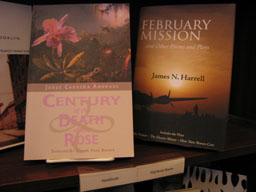NewSouth Books Shown at Poets House Showcase
Tuesday, April 29th, 2008 by Mary KatherineThe 16th Annual Poets House Showcase recently featured all of the new poetry books published in the United States this year, including books by NewSouth authors. More than 2,000 titles were on display from April 12-19 at the historic Jefferson Market Library.

According to Poets House website, “The Showcase provides writers, readers, and publishers with a fascinating vantage point from which to assess publishing and design trends and linguistic, aesthetic, and philosophical shifts … the Showcase reflects Poets House’s mission to make the range of modern poetry available to the public and to stimulate public dialogue on issues of poetry and culture.” All the poetry book titles can be found in the fully-searchable online Directory of American Poetry Books featuring over 20,000 poetry titles published between 1990 and 2006.
NewSouth poetry books present in the directory and at the showcase include:
The World According to Whiskey: Tom House’s poems are tough and graphic, and they bear witness to the underbelly of a Southern culture with no room for the disenfranchised—the poor, the weird, and the broke.
And All the Layered Light: Using the settings and imagery of his native rural Kentucky, Charles Semones creates a collection of poems that transcend time and place. It’s Southern Gothic writing at its finest.
Century of the Death of the Rose: The works of the late Ecuadorian poet Jorge Carrera Andrade are presented in English and the original Spanish in this volume of his poetry, selected and translated by Steven Ford Brown.
February Mission: Jim Harrell’s volume of poetry and plays ranges back in time over his own rich history, visiting places he’s been and wars he’s experienced, friendships shared and loves lost, and life on the littoral coast, which inspires much of his work and describes his emotional home.
Straying Toward Home: The poems, like the title of this book, are delicious paradoxes. James Mersmann’s vivid images and beneficent intelligence are a continuous pleasure.
It’s Good Weather for Fudge: Conversing with Carson McCullers: Sue Walker imagines a friendship and conversation with McCullers as they share memories of two women growing up in the Deep South, McCullers in Georgia and Walker in Alabama.
One More River to Cross: The late John Beecher’s powerful, spare verse is brought together in this collection, compiled and edited by Steven Ford Brown.
To learn more or to search the Directory of American Poetry Books, check out the Poets House website. Find all the above titles and more at NewSouth Books, Amazon. com, or your favorite local or online retailer.


